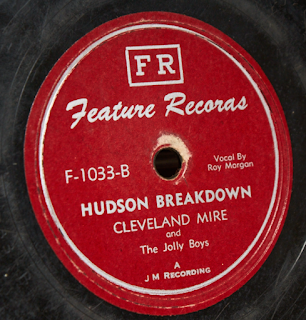The Sundown Playboys was a group started by Lionel Cormier in the 1950s. The group continued to play until Lionel died of a heart-attack on stage in 1971. Accordion player Pat Savant eventually joined the band and briefly knew Lionel; having met him only twenty minutes before the veteran played his last song.
Oh, 'tite fille, moi'je connais heir soir,
Je partis d'a où j'etais,
Pour te joindre, jolie chère.Oh, ye yaille, la promesse j't'ai mal y fait,Les memes mots qu'j'ai dit à une,Je les dis à une et l'autre.Oh, tite fille, vingt ans moi je connais,Moi je vais dire à cette heure,La parole pour réparer.Oh, ye yaille, il a dit, jolie cœur,Pour demande des pardonnances,Il connait il a près mal faire.
 |
| Sundown Playboys Sep 26, 1972 |
Before long, Pat was leading the group in local dance halls. A sophomore at a Lake Charles Catholic high school, he was given a chance to fill Cormier's shoes; while he was a novice in the frenzied atmosphere of Cajun dance halls, he became, at the age of 15, a Sundown Playboy.2 Only a school kid at the time, Savant was a young accordion prodigy, meeting Lionel Cormier minutes before he died. So he was rather surprised when he was invited to step in and fill Lionel’s big shoes.5 He and his group including Lionel's son, Lesa Cormier on drums, Wallace "Red" Touchet on fiddle, Darrell Higginbotham on voclas and guitar, Danny Cormier on bass and Larry Miller on steel, landed four songs on tape at Swallow studios for their next release 45 release.
After a recording session with Floyd Soileau at Swallow Records, Pat Savant was in the record shop talking with another teenager about the group's latest recording efforts when the other youngster wondered aloud what the attitude of the famous Beatles would be towards this style of French music.6 Pat, known to be an aficionado of all things British, convinced Lesa and Swallow records producer Floyd Soileau to send a copy of the 45 RPM with a letter to George Harrison of The Beatles in 1971.1 He also noticed that the record bins in K-Mart were filled with Apple product, so he mailed a copy of the single addressed ‘The Beatles, London, England’.5 According to Darrell's son David,
Pat sent a copy of the recording to the Beatles' George Harrison as a joke. The joke turned out to be on Pat because George Harrison sent a letter back asking for permission to release it on the "Apple label".
Oh, little girl, I know last night,
I left from where I was,
To return to you, pretty girl.Oh, ye yaille, the promise I poorly made to you,The same words that I said to one person,I say them to one and another.Oh, little girl, twenty years old, I know,I'm going to say right now,Words to make amends.Oh, ye yaille, he has said, pretty sweetheart,Begging for forgiveness,He knows he's doing something wrong.
 |
| Sundown Playboys |
According to legend, George Harrison heard the record and loved it. Apple Record's A&R manager Tony King wrote back within two weeks to say that Apple would put out the single over the pond.5,6 The response came as a surprise to everyone. According to Floyd Soileau,
It was a typical French group from Lake Charles, typical record, there was no big thing about it. Even when I had a call from Apple's New York office, I still couldn't believe what was happening. I have a back-page ad they ran in Billboard,. I've got the sample promotion kit 'Back to Mono' with the 78 copy and the 45 copy and the promo stuff they had inside. And I love to tell the story because it's one of the carziest things that can happen in this business.4
In the summer of '72 Apple released the same recordings that Swallow had already pressed the "Saturday Night Special" and "La Valse de Soleil Couché (The Sundown Waltz)" in both the U.S. and Europe. It was pressed as a promotion on 45RPM and surprisingly on 78RPM as part of Apple's short-lived novelty "Back to Mono" campaign. Though Apple bought a full back page ad in Billboard, the record did not receive the wide airplay that it reportedly had in Europe,2 but was used in the movie Sister, Sister in 1988.3 Later, the recording was released on the CD "Come and Get It: The Best of Apple Records."
The Sundown Playboys became a major influence on the Smiths’ lead singer Morrissey, who included their single on his 2003 release Under the Influence, explaining in the extensive liner notes that the shock of “Saturday Nite Special”’s never-before heard sound had haunted him for years without any context or reference point, and without even knowing the name of the song or the band, he’d remembered the tune after hearing it only four times!5 Because of the scarcity of the 78RPM pressing (some estimates place it as low as 150 pressings), the value of a copy can reach in to hundreds of dollars.
- http://www.offbeat.com/music/pat-savant-self-titled-mte/
- http://www.hechicero.com/louisiana/sundownplayboys.html
- http://www.downtowncajunband.nl/sitewillem/Acadiana%20Gateway/music/lcormier.htm.html
- South to Louisiana: The Music of the Cajun Bayous By John Broven
- Eclectic Company Meet The Sundown Playboys By Leslie Berman
- Daily World (Opelousas, Louisiana) 26 Sep 1972, Tue Page 7










